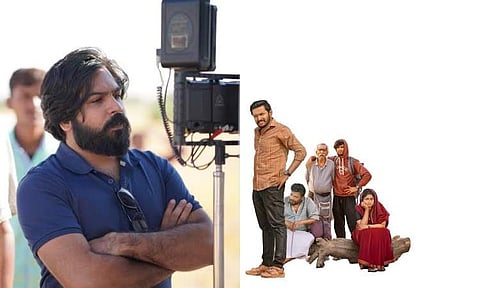

One usually associates Indian films shot in Varanasi with an air of darkness, considering the significance of the place and their portrayal in films such as Masaan and Mukti Bhavan. So, when I first saw the trailer of Falimy, I let out a sigh when it became evident that the makers were thinking of something more lighthearted -- a fact further confirmed by the film, featuring an instantly endearing story bolstered by an array of strong performances. Nithish Sahadev, making his directorial debut with Falimy, chose to pick Varanasi because he got drawn to the "whole vibe of the place," and he doesn't mean in the 'holy' sense.
"I simply wanted the film to have a unique life -- and hopefully get a new look out of that place," says Nithish. There was, however, an idea to take the darker route, in the line of something like Mukthi Bhavan, but Nithish didn't think such an approach for a debut feature would be wise, which explains the pleasing aesthetic that the film now has. "I can probably do something like Mukthi Bhavan the next time, but with Falimy, I imagined myself as one of the audience members, striving to make it a widely accessible film. It was evident from all the joy I sensed in the theatres I visited," he recalls.
Falimy was an outcome of many drafts, which, in hindsight, proved to work to the film's advantage. "There was a time when I was thinking, 'I wrote so much for the audience; now, let me write a few portions for myself,'" he laughs. "Here, let me show you something new, and that's how that big experiment in the climax happened. When you are trying to do an emotional flip -- sadness to humour -- that way, you get concerned about whether it would work out. I'll tell you what's odd, though: It didn't work when we did a preview screening, but it worked well for the general audience. During that pivotal moment, people laughed, and I was relieved. Sometimes you have to take that risk, you know."
Perhaps this ability to take such daring risks came out of his stint working in the films of filmmakers like Vipin Das and Jude Anthany Joseph. The Thiruvananthapuram native, now based in Kochi, started as an assistant director in Mudhugau, the directorial debut of Vipin Das (Antakshari, Jaya Jaya Jaya Jaya Hey), following which he worked with Jude Anthany (Om Shanthi Oshana, 2018) in Oru Muthassi Gadha. When it came time to make his first feature, though, Nithish experienced a strange situation. Falimy was initially announced with Antony 'Pepe' Varghese. However, the project went through some major changes, including the casting of Basil Joseph in the part that was supposed to be played by Pepe. Moreover, it wouldn't have been the same movie.
Nithish shares that his protagonist wasn't anything like Basil's character in Falimy. "He was born with a congenital condition called situs inversus; he was depressed, had a different job, and his marriage wasn't happening due to this condition -- the placement of the internal organs are a mirror image of a normal human being's -- which affects one out of one lakh individuals. I know someone like that -- still unmarried because of what is seemingly not a big deal. Besides, the character had the shades of someone like Fahadh Faasil in North 24 Kaatham. It would have become a completely different film."
As for the inspiration for the story, Nithish drew from characters around, in addition to a little of his personal experiences. "It's not like Malayalam cinema hasn't explored characters like these before, but I wanted to bring some novelty to them, the house they live in and how they live there. Narrow-minded, miserly characters unwilling to break out of their comfort zone."
One of the notable central characters in Falimy, the patriarch played by Meenaraj Palluruthy, was born out of a need to create a grandfather who was "on a whole different trip" as opposed to his son (Jagadish) and grandson (Basil). "I didn't know grandfathers like that because the grandparents of most people pass away when they are little. So I wanted to see a grandfather who loved to travel, who wasn't interested in having a son and paid little attention to him -- a quality that he passed on to his son as well. I mean, 75% of the people around us weren't interested in having children but did so out of family pressure. Though I didn't think too deeply about these things when I wrote the characters, I realised there was a lack of conversation between them. I imagined a story with these characters with enough commercial crowd-pleasing ingredients. I would admit, though, that we have slightly deviated from some of the topics we wanted to discuss to make it more accessible, but, at the same time, I wanted to attain a balance between serious and comical elements without making it too feel-good."
Falimy also benefits from the team's decision to shoot all its exteriors in actual locations instead of a set. They filmed in real trains, train stations... "There was a point where we only had two minutes to get out of the train, or else we would've ended up in Tirupati," he chuckles, adding that the driver was a Malayali. "For shooting the train portions, a seven-member team was on board. Basil carried the battery. Manju (Pillai) chechi carried the monitor and lights. I was sitting beside the director of photography (Bablu Aju) to supervise the scenes."
And what about the hilarious Dilwale Dulhania Le Jayenge homage? "Well, that took a lot of effort, especially to find a night train and an empty station -- a solitary one where no other train would pass while shooting. We needed a whole night for that. We were supposed to do it differently, but we couldn't. Fortunately, it has worked out well, so I've no complaints."